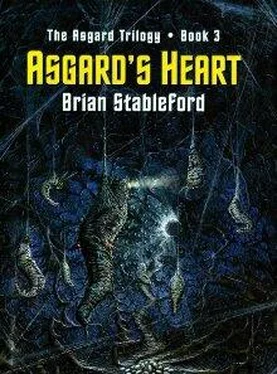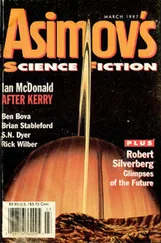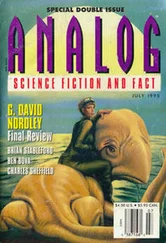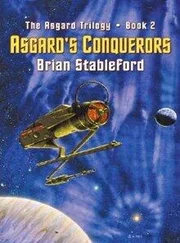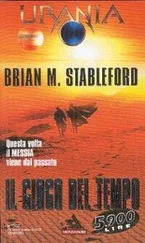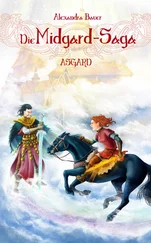As the platform began to sink into the depths, carrying the truck away into abyssal darkness, I put out a hand to steady myself against the wall, feeling suddenly very weak.
Eventually, the wall lit up, and there she was, looking as sprightly as ever.
“You can remove the explosive charge now, Mr. Rousseau,” she said. “It’s quite safe.”
“Considering that your power is supposed to be not far short of godlike,” I told her, “you’re pretty damn useless every time it comes to the crunch.” I figured I was entitled to feel a little resentful.
“I must apologise for not warning you that it was about to happen,” she said, “but as you know, they were able to listen in on our conversation.”
“You knew what they intended to do?” I said.
“Certainly.”
“And you deliberately let them get away?” I was annoyed, having jumped to the conclusion that the Nine were really quite glad to wave goodbye to my transporter, on the grounds that it would narrow my options to the point where I’d have no choice but to go along with their plans. But I’d misjudged them, as usual.
“When we realised that something had been implanted in the Tetron’s brain—and that it was not akin to the programme sent to colonise your own brain,” she said, equably, “we could only conclude that it had been intruded by the enemy. We had then to consider what the best thing was to do with a possible enemy in our midst. Had it shown any hostile intention, we would of course have destroyed it, but in fact it seemed to want only to escape. It seemed to us to be an opportunity not to be missed, though of course we were concerned to conceal that judgment.”
“Opportunity?” I echoed. “Opportunity to do what?”
“As you guessed yourself,” she said, “the biocopy which has apparently taken over Tulyar’s body knows how to get into the deeper levels, despite the apparent difficulties of so doing. We must assume that it knows how to reach its destination.”
“How the hell does that help us? He’s got the only transport!”
I have to admit that she was very patient with me. “The reason that it took time to construct the vehicle,” she pointed out, “was that it was very difficult to programme the machines which built it. Now that they know how to do it, they can construct a duplicate in a matter of hours. We had quite sufficient time to equip the vehicle which they have stolen with a device whose model I’m sure you remember.”
Enlightenment dawned.
When the Tetrax had sent us into the levels to carry plague into the Scarid empire, they had thoughtfully equipped our boots with a device which leaked an organic trace, easily followed by an artificial olfactory sensor. That device, detected by John Finn, had led the Scarida down to the world of the Isthomi just in time to throw me in at the deep end of the crucial moment of contact. I had always assumed that it was 994-Tulyar who had been responsible for the trace.
Now, it seemed, the tables had been turned. Finn, Tulyar, and their allies were laying a trail which might lead the corporeal me—and a few friends—all the way to the Centre.
The boot, for once, was on the other foot.
At this point in my story, I fear, the narrative flow becomes slightly confusing, for reasons which the reader may already have figured out.
I must admit that I did not anticipate any considerable confusion myself, even when I realised that I had tacitly given way to the Nine’s demand that I be copied. I had interfaced with the Nine on several previous occasions, and I supposed that this special interfacing would not feel significantly different. At the end of it, I knew, that creature of flesh and blood which I thought of as the real me would simply get out of the chair and continue with my real life. The fact that there would be a ghostly entity drifting through the vast labyrinth of silicon neurons and optical fibre sinews that was Asgard’s diffuse “brain” which would also think of itself as Mike Rousseau, sharing all my knowledge, all my memories, and all my hang-ups, did not strike me as an item of any great relevance to the flesh-and-blood Rousseau’s future experience of self.
It turned out that I was wrong.
Exactly how and why I was wrong will become clear in due time, when my story—perhaps it would now be more appropriate to say stories —approaches its—or their —climax. For the moment, I need only say that the person who is recording this story has two sets of memories to draw upon, and must—if the story is to make sense—describe two independent series of events.
It might perhaps be easier for the reader if I were simply to shift one of the continuing narrative threads into the third person, possibly referring to the software copy as “the other Rousseau” while retaining “I” for the flesh-and-blood appellant which held the sole entitlement to it until the crisis in my affairs made division essential. But that would misrepresent to you the nature of the entity that is now telling the tale, and I cannot help but feel that such a move would be misleading, if not tantamount to self-betrayal.
I must, therefore, ask my readers to forgive me for exposing them to the possibility of mild disorientation. From this moment on, the perpendicular pronoun will be applied without discrimination to two very different entities—but given the fact that those two persons embarked upon very different adventures in what appeared to them to be very different worlds, I do not think it likely that the reader will ever be in doubt as to which of the two is the referent of any specific passage of prose. In the interests of simplicity, I shall present the two narratives in two series of alternating chapters, although there is a certain arbitrariness about the parallels thus produced. Software time is no more like clockwork time than software space is like the kind of space that is to be found in a cupboard or a cosmos.
There seemed to be a sky, which was grey and overcast, heavy with roiling clouds racing before an erratic wind. The clouds seemed so low as to be barely out of reach, as though I might reach up my hand and feel the cool, moist breath of their passage.
The sea was a duller grey, the colour of lead, and although it was no less troubled, its waves trod the paces of a dance that was far more leisurely than the light fantastic of the clouds. There was very little spray, and it seemed as though the ocean were made of some more glutinous compound than mere water, as if it were thickened by dissolved slime.
The ship on whose deck I found myself standing was a curious vessel, more like a sketch of a ship than a real entity of wood and iron. It seemed to me to have been modeled on a poorly-remembered image of a Viking longboat, with a red-and-gold patterned sail billowing upon its single mast, and forty pairs of oars moving in an uncannily-precise rhythm, quite unperturbed by the wayward rise and fall of the waves.
There were no visible oarsmen; the oars projecting from the flank of the vessel seemed to work entirely by themselves, growing organically from the hull. The deck, which extended most of the length of the ship, was lined with silent warriors, huge and blonde, with horned helmets and armour of gleaming bronze. They carried spears and broadswords, but the swords were sheathed. They stood immobile, like carved chessmen waiting for a game to begin. There was no possibility of mistaking them for real people; like the boat, they seemed to me more like entities in an animated cartoon.
The prow of the ship was shaped into a curious figurehead with anchored snakes instead of hair, and the snakes moved sluggishly as the bows dipped and rose with the swell. Beneath this image of Medusa, carried high above the waves, there was a sharp spur, which gleamed as if it were made of steel. Had the gorgon’s head been attached to a body, it might have been riding upon the spur as if on a broomstick, and the implication of that absent form gave the spur a gloss of phallic potency.
Читать дальше
